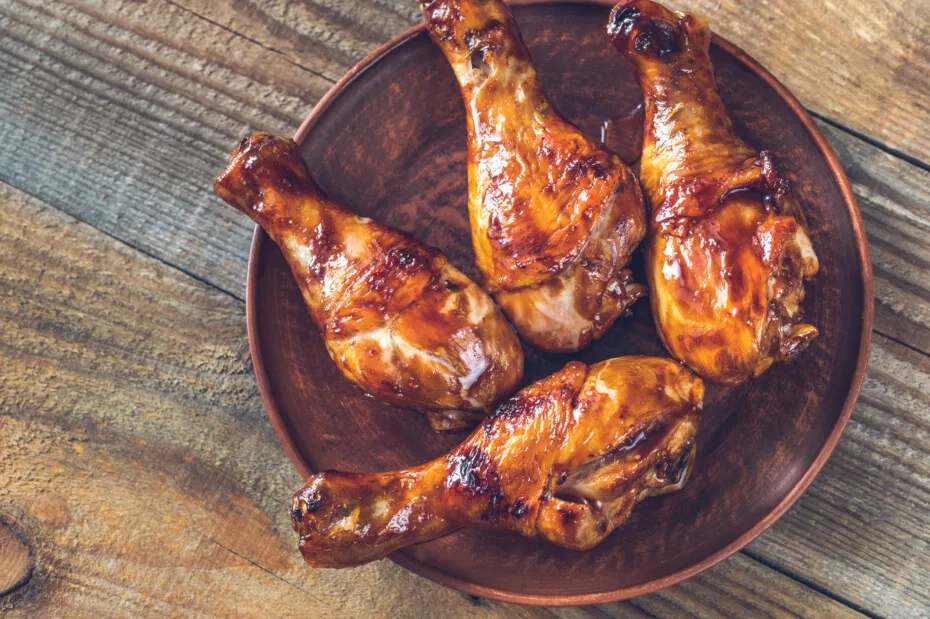Chewy chicken is probably the worst thing that can happen when cooking chicken. It’s almost as bad as burning chicken.
Nevertheless, we’ve all cooked chewy chicken at one time or another.
The key to preventing this mistake from happening over and over again is knowing why your chicken is chewy.
Contents
Why Is My Chicken Chewy?
In some cases, chicken can become chewy because of overcooking or undercooking.
However, sometimes your chicken can end up rubbery even though you did everything right.
Woody Breast
Have you ever seen a BBQ chicken breast recipe that you just had to make? You bought the ingredients, seasoned the chicken breast, fired up your natural gas grill, and cooked them to perfection.
However, when you ate the BBQ chicken breast, you were met with unpleasant chewy chicken.
You reviewed the recipe to see if you made any mistakes, but you followed it to a tee and still ended up with chewy chicken.
The truth is even if you followed the recipe precisely, you could still end up with chewy chicken breast.
Chewy chicken can naturally occur because of a deformity called woody chicken breast. Woody breast causes the broiler chickens’ muscle fibers to stiffen, causing chewy chicken.
The exact cause of woody chicken is still unknown. However, some scientists allege woody chicken breast could be associated with antibiotics and synthetic hormones.
These additives are used to help chickens grow as much as possible in a short amount of time.
Woody chicken can impact 5%-10% of chicken breasts. Additionally, woody chicken breast is not toxic to humans.
However, woody chicken breast is a distasteful meal.
Undercooking
Undercooked chicken can also cause chewy chicken breast. You can easily identify undercooked chicken because it feels dense yet jiggly.
Chewy chicken breast also has a shiny rubber-like appearance.
White meat such as chicken must be cooked to an internal temperature of 165°F.
In contrast, dark chicken must be cooked to an internal temperature of 180°F.
Use an infrared thermometer to monitor the internal temperature of your chicken.
If you remove the chicken breast from the heat too soon, the collagen will not break down, resulting in chewy chicken. Collagen will tenderize the chicken breast.
If you are smoking a whole chicken in an electric smoker or roasting it in the oven, it’s best to tie the legs together with kitchen twine.
This will prevent the legs from cooking faster than the rest of the chicken and burning.
Insert a thermometer into the deepest part of the thigh but do not touch the bone when checking the chicken’s temperature.
The chicken is finished cooking when it has an internal temperature between 165°F-175°F.
Overcooking
Chewy chicken can also occur if you overcook it. Overcooked chicken has a dense, hard, and stringy texture.
Overcooked chicken can happen when you cook the chicken for too long.
Essentially all of the moisture will be sucked out of the chicken, leaving you with dry, chewy chicken.
White meat is leaner than dark meat. It is easier to overcook white meat than dark meat.
Nevertheless, it doesn’t matter which cut of chicken you are preparing.
You should cook chicken at medium to medium-high with a temperature of at least 350°F.
In addition to this, you will also want to cook the chicken with indirect heat so it can slowly come up to the recommended temperature.
Depending on the thickness of the chicken breast, it should be cooked for 7-8 minutes per side.
However, if you pound the chicken with a meat mallet, it will cook for about 4-5 minutes per side. Make sure you cook the chicken breast to 165°F.
RELATED:
Why Is My Steak Chewy?
How To Prevent Chewy Chicken
To best way to prevent chewy chicken is to brine it in a mixture of water and salt.
Simply combine 1/4 cup of kosher salt and water and stir it until the salt dissolves.
If you do not have kosher salt, you can use 2 tablespoons of sea salt or table salt and 4 cups of water.
Place the chicken breast into the salt-water brine and soak it for 30 minutes.
The chicken breast will absorb moisture from the brine, which makes them less likely to become chewy.
Remember to wash the excess salt from the chicken before cooking it.
How To Fix Chewy Chicken
Even if your chicken ends up chewy, there may be a way to save the chicken. These methods are not the chicken savior.
However, it will make the chicken more pleasant to eat.
Chicken’s subtle flavor pairs well with several other ingredients, so you can use it in several different dishes.
Baste the Chicken With Sauce
The sauce method works best with overcooked chicken breast. The sauce will add moisture and flavor to the chewy, overcooked chicken breast.
Homemade BBQ sauce or Spicy BBQ sauce is the best option to add to the chewy chicken breast as it is loaded with a lot of sweet, smoky flavor.
However, you can also use honey mustard sauce, pesto, cream sauce, or any sauce you desire.
Use the Chicken Sandwiches
If you use the chicken on a sandwich, it will be in the background instead of being the main focus of the meal.
You can add lettuce, tomatoes, avocado, red bell peppers, or whatever toppings you desire.
You can also smother the chicken with ranch dressing, mayonnaise, or any type of sauce or dressing you prefer.
Since you are working with chewy chicken, use a soft bread such as brioche or a potato roll to disguise the chicken’s chewy texture.
In addition to this, slice the chicken thinly to lessen its chewy texture.
Chicken Soup
You can also make chicken soup with overcooked chicken. You can sauté carrots, onions, leeks, celery, and garlic in 2 tablespoons of oil or butter.
Add the chicken along with salt, pepper, a bay leaf, and chicken broth.
Let the chicken soup simmer over medium-low, then add noodles, rice, or your preferred grain and simmer it until the grains are tender.
Salad
Sometimes reheating chewy chicken can only make the situation worse. In this case, you can eat the chicken cold. Chop the chewy chicken into pieces or shred it.
Mix the chicken with Dijon mustard, mayonnaise, fresh herbs, chopped onions, and garlic and turn it into a chicken salad.
Final Thoughts
Chewy chicken isn’t the end of the world. However, need to know why your chicken is consistently turning out chewy.
Luckily, you won’t have to deal with chewy chicken since you know how to prevent and fix chewy chicken.

I have been smoking and grilling meat from an early age and enjoy sharing my knowledge and expertise through the hundreds of articles I have written about BBQ. I hope to make everyone’s BBQ journey that little bit easier.

